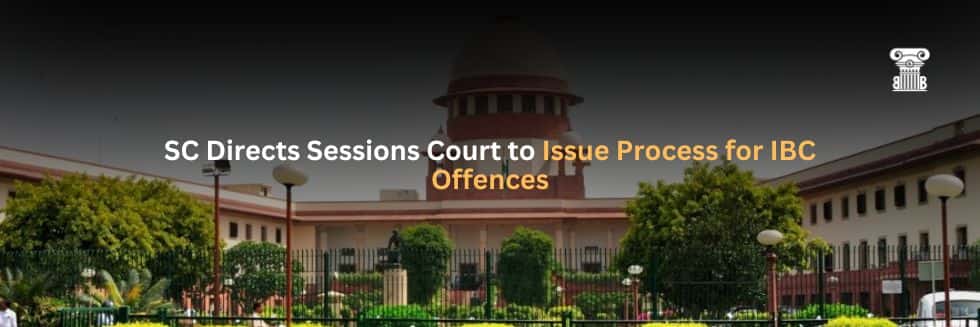In the case of Insolvency and Bankruptcy Board of India v. Satyanarayan Bankatlal Malu & Ors., the Supreme Court upheld the issuance of process by the sessions judge to the accused. The accused challenged the summons issued by the Sessions Judge arguing that subsequent amendments to Section 435 of the Companies Act, 2013 authorized the Judicial Magistrate instead of the Sessions Judge to issue summonses for offences punishable under the Insolvency and Bankruptcy Code (IBC).
However, the Court determined that the power to try offences under the IBC was vested in the sessions judge not the magistrate through ‘legislation by incorporation’. Therefore, the Sessions Judge rightfully issued the summons to the accused despite subsequent amendments to the Companies Act.
CASE DETAILS:
Insolvency and Bankruptcy Board of India v. Satyanarayan Bankatlal Malu & Ors.
Criminal Appeal No.3851 of 2023
Supreme Court
Coram: Justices BR Gavai and Sandeep Mehta
BACKGROUND:
- In this case, the accused received a summons from the Sessions Judge for an offence punishable for up to two years under the IBC.
- The accused challenged the summons issued by the Sessions Judge arguing that subsequent amendments to Section 435 of the Companies Act, 2013 authorize the Judicial Magistrate, not the Sessions Judge to issue summonses.
- However, the complainant, the Insolvency and Bankruptcy Board of India (IBBI) argued that the Sessions Judge rightfully issued the summons to the accused.
- They contended that the power to issue summonses by the Sessions Judge was specifically granted since the enactment of the Code.
- Therefore, the subsequent amendment to Section 435 of the Companies Act does not diminish the Sessions Judge’s authority to issue summonses.
- The High Court invalidated the summons issued by the Sessions Judge to the accused stating that subsequent amendments to Section 435 of the Companies Act, 2013 have granted the power to issue summons to the magistrate for offences punishable up to two years. Therefore, the Sessions Judge would not have the authority to issue a summons.
- Therefore, the present appeal has been filed.
OBSERVATIONS:
The Court found merit in the argument put forth by the complainant/IBBI determined that the present case involves ‘legislation by incorporation’ rather than ‘legislation by reference’. In such cases, the effect of incorporating the original Section 435 of the Companies Act into Section 236(1) of the IBC has been in place since the enactment of the IB Code. Consequently, any subsequent amendments to Section 435 of the Companies Act do not affect Section 236(1) of the IB Code. Therefore, the Court upheld the summons issued by the Sessions Judge despite subsequent amendments to Section 435 of the Companies Act authorizing judicial magistrates to issue summonses for offences committed under the IBC.
The Court elaborated on the distinction between ‘Legislation By Incorporation’ and ‘Legislation By Reference’:
- ‘Legislation By Incorporation’ involves applying the provisions of the former law to the later law where the later law specifically mentions that the provisions of the former law are applicable and subsequent changes in the former law do not affect the later law.
- On the other hand, ‘Legislation By Reference’ entails applying the provisions of former law to the later law through a general reference and in the event of any amendment to the former law, the later law would be affected accordingly.
JUDGEMENT:
The Supreme Court upheld the issuance of process by the sessions judge to the accused stating that offences under the Insolvency and Bankruptcy Code, 2016 would be tried by the Special Court established under Section 435 of the Companies Act, 2013 and the sessions judge would have the power to issue process against the accused. Reversing the High Court’s decision, the Bench comprising Justices BR Gavai and Sandeep Mehta interpreted the scheme of Section 236(1) of the IBC to hold that the power to try offences punishable under the IBC was vested in the special court by ‘legislation by incorporation’.

